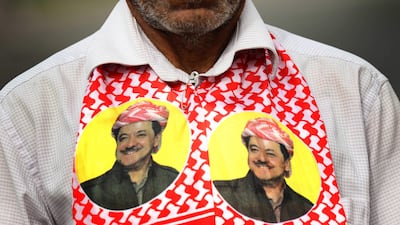In the end, what should have been a lifeline turned into a noose. President Masoud Barzani, the dominant figure in Kurdish politics in post-Saddam Iraq, could not remain on his throne after he bungled on independence, a GOAL that had come to define him.
He is set to remain powerful behind the scenes, further undermining democracy in the autonomous government he was instrumental in creating.
On October 29, Mr Barzani made his first public speech since Iraqi forces rolled into Kirkuk two weeks earlier, prompting the rapid unravelling of Kurdish territorial gains made at the expense of Baghdad since the end of the second Gulf war. He announced he was stepping down as president.
The loss of Kirkuk and its oilfields in particular was the death knell to secession from Iraq, which Mr Barzani had hoped to prompt with a misguided independence referendum on September 25. The referendum also turned Turkey and Iran against the Kurdish region, and the neighbouring countries worked in concert with Iraqi prime minister Haider Al Abadi to prevent a break-up of the country. The US, a long-time ally of the Kurds, refused to come to their aid, also committed to the territorial integrity of Iraq. Mr Barzani had fundamentally miscalculated the reaction from abroad, and had hoped to exploit the supposed weakness of the Iraqi state after three exhausting years of war against ISIL.
The Iraqi Kurd president had staked his political future on carving a Kurdish state out of northern Iraq. Unwilling to relinquish power, he felt he had little choice but to up the ante. Presidents of the Kurdistan Regional Government are only supposed to serve for two terms, and his second term expired in 2013. He managed to convince the Kurdish parliament, which is dominated by the Kurdistan Democratic Party (KDP) he heads, to extend his term by two years. When this extension expired, he simply stayed on, extinguishing any democratic legitimacy for his rule. To compensate, he fanned the flames of Kurdish nationalism by promising independence.
When the referendum backfired, it was clear Mr Barzani had gambled too much of his political capital on one card and lost.
Read more: Kurdish independence bid undoes goodwill earned in fight against ISIL
Losing a game of such high stakes has cost him and the Kurds dearly. It is not only that have they been stripped of key territory gained in the wake of the Iraqi army's collapse in 2014, or through political manoeuvring even before ISIL threw Iraq into chaos. The catastrophic aftermath of the referendum has also deepened the rift between the KDP and the Patriotic Union of Kurdistan (PUK), the other political powerhouse in the Kurdish region. Reluctant to go ahead with the plebiscite, but unable to resist its patriotic appeal, the PUK cut a deal with Baghdad to allow Iraqi troops into Kirkuk.
The resulting fallout will strain the relationship of the two main Kurdish parties for years to come, raising the spectre of prolonged political deadlock, or worse. The two parties fought each other in a civil war in the nineties, which ended after Mr Barzani invited Saddam Hussein's troops into the Kurdish region to stave off defeat. There are no guarantees that history will not repeat itself.
Political stasis is already evident. Hopes that Mr Barzani's retirement would reform the ossified power structures of the KRG, kept in place by patronage networks and intimidation, were dashed even before the president announced he was stepping down. Presidential and parliamentary elections hastily announced after the referendum were just as hastily postponed indefinitely after the loss of Kirkuk, leaving the Kurdish region leaderless and with an expired parliament.
In his abdication speech, Mr Barzani said that in the absence of a successor, presidential powers would be divided between prime minister Nechirvan Barzani, his nephew, a KDP-dominated parliament, and the judiciary, which is subject to party patronage. He was at great pains to emphasise that he was not retiring from politics, and would continue his struggle for independence.
By stepping down, Mr Barzani has taken himself out of the firing line, but not before undermining the KRG's institutions sufficiently to be able to rule behind the scenes. Although no longer president, he will preside over the rubble of Kurdish democracy, clinging on to the shattered dream of Kurdish independence.

